King of England and Scotland (29 May 1660-6
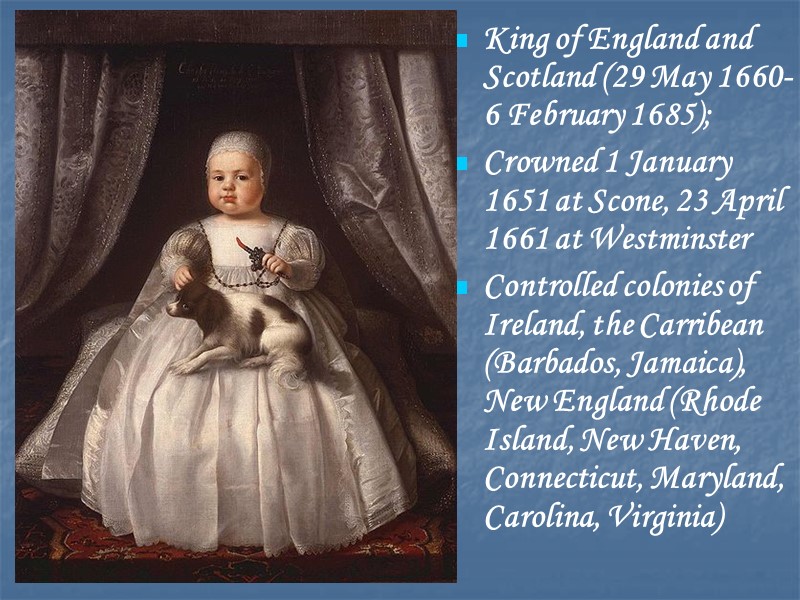
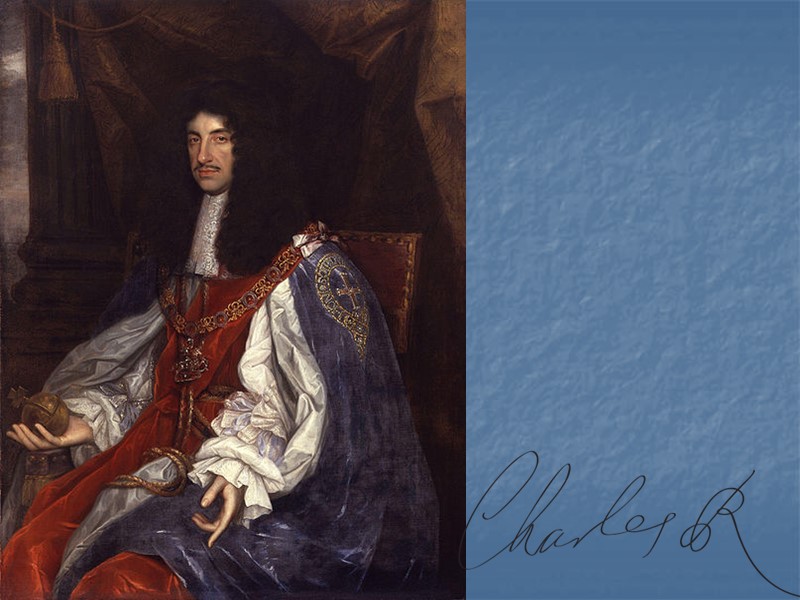
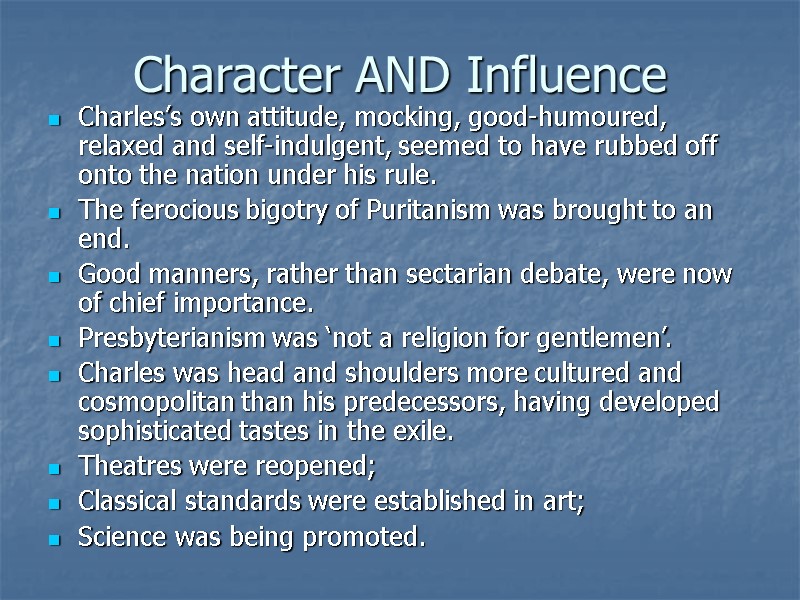
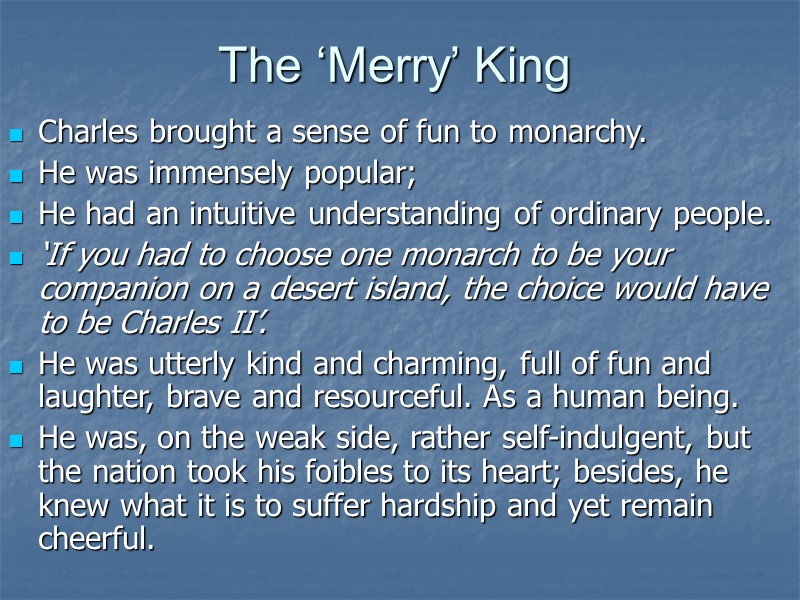
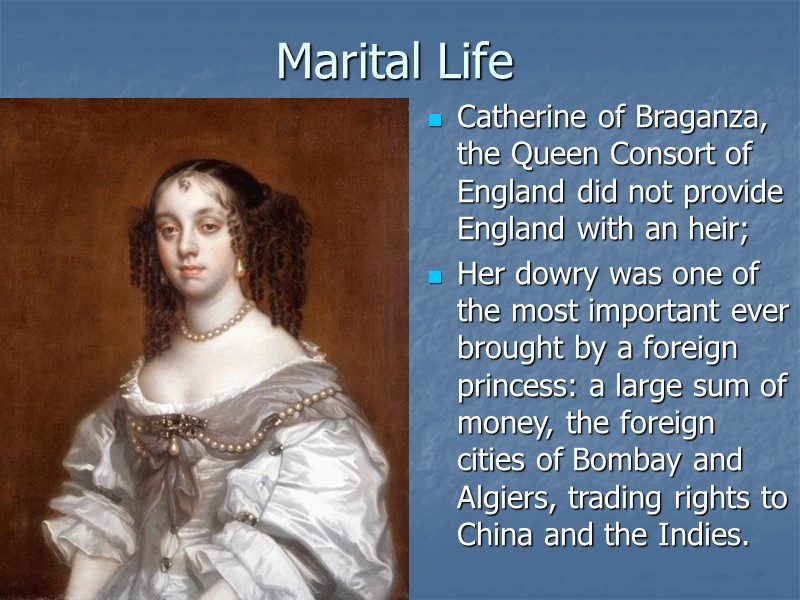
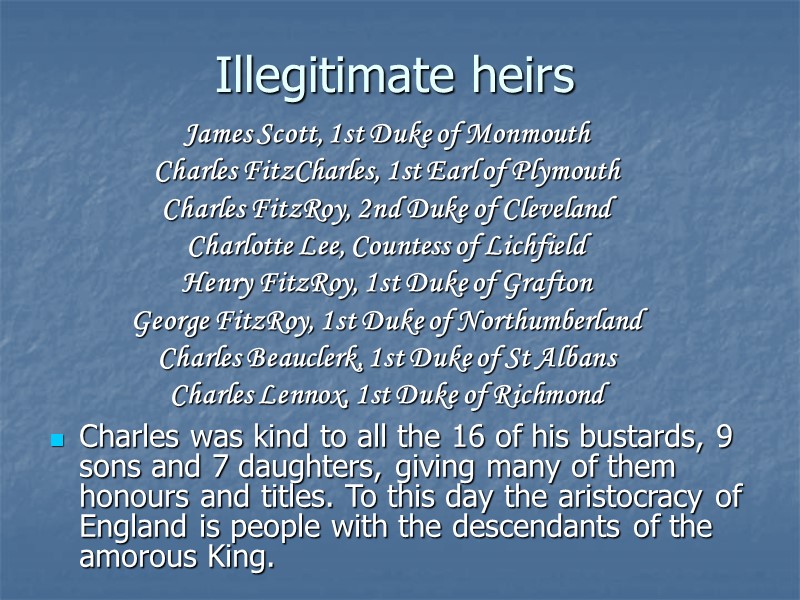
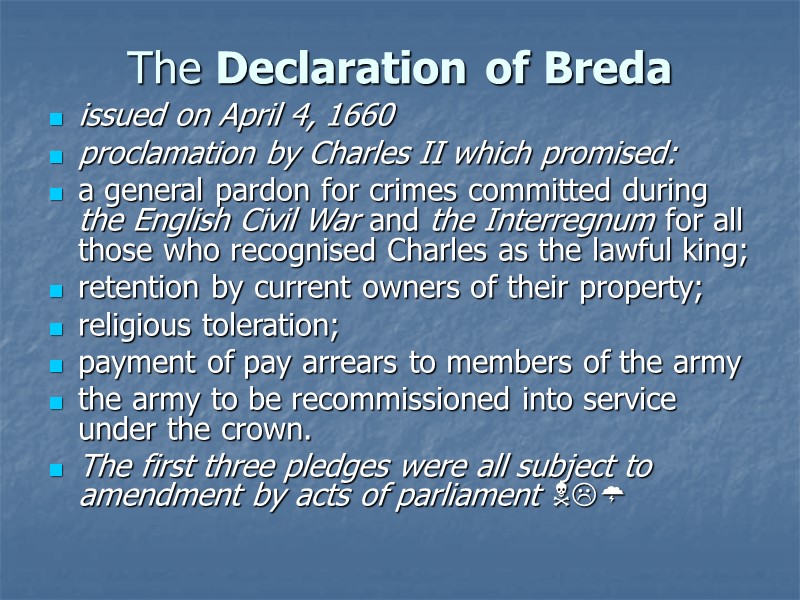
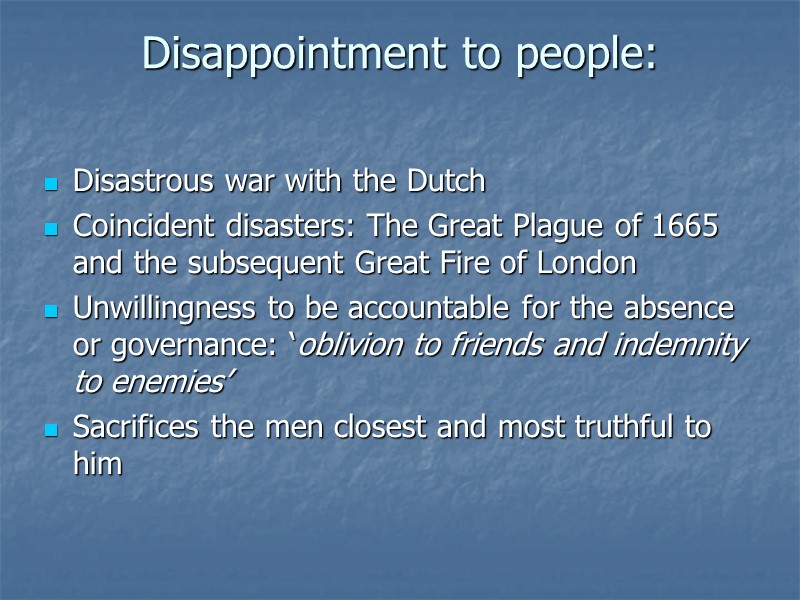
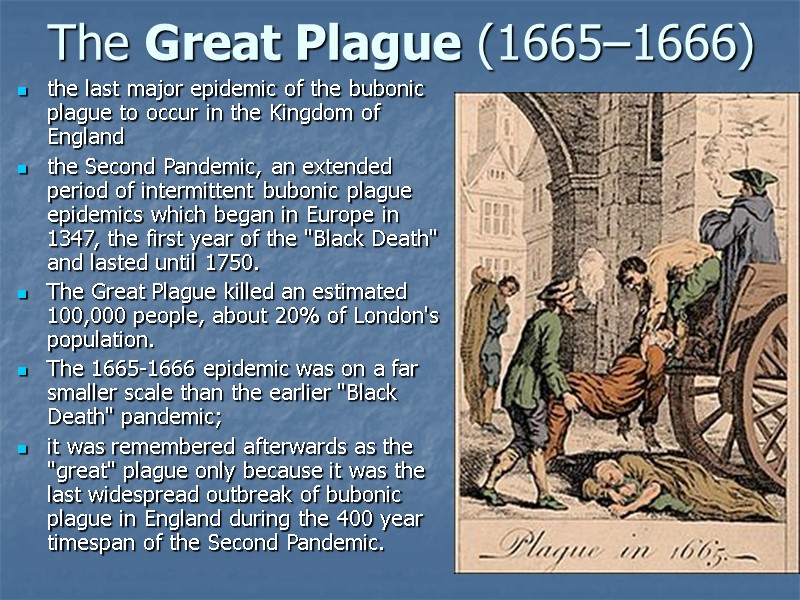
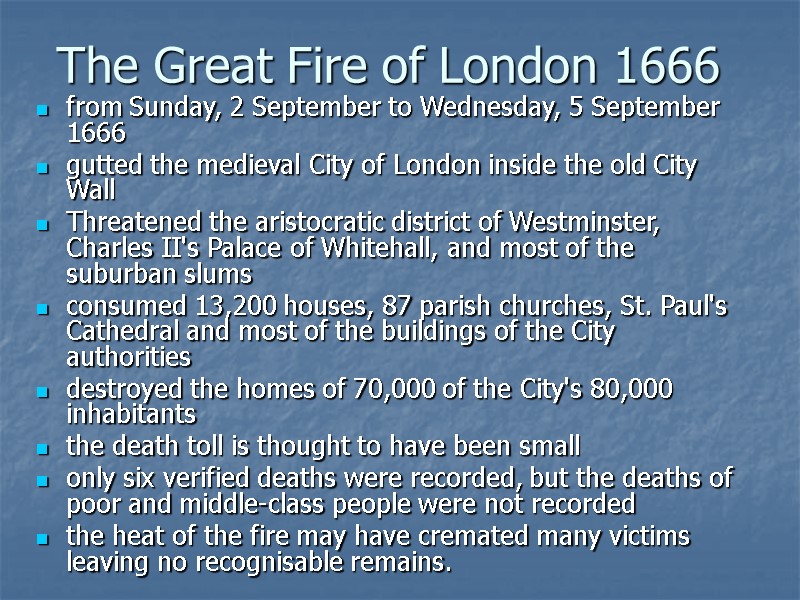

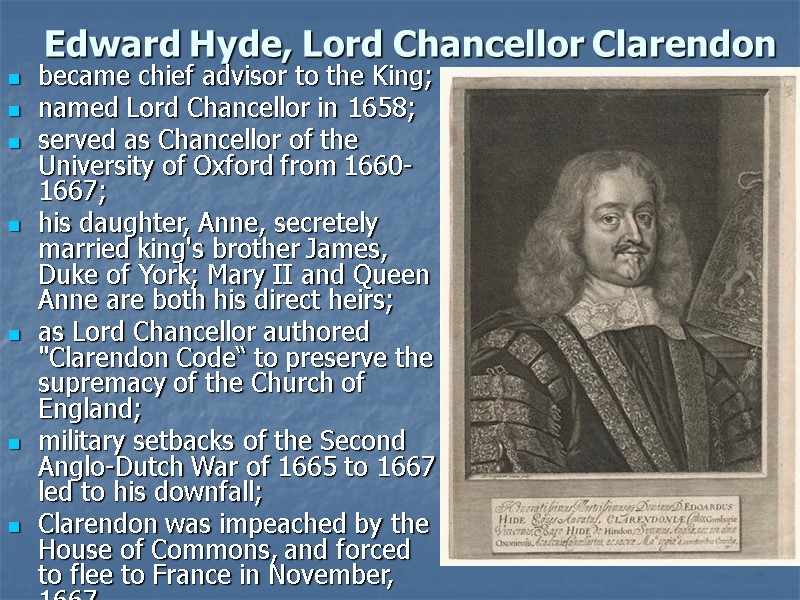
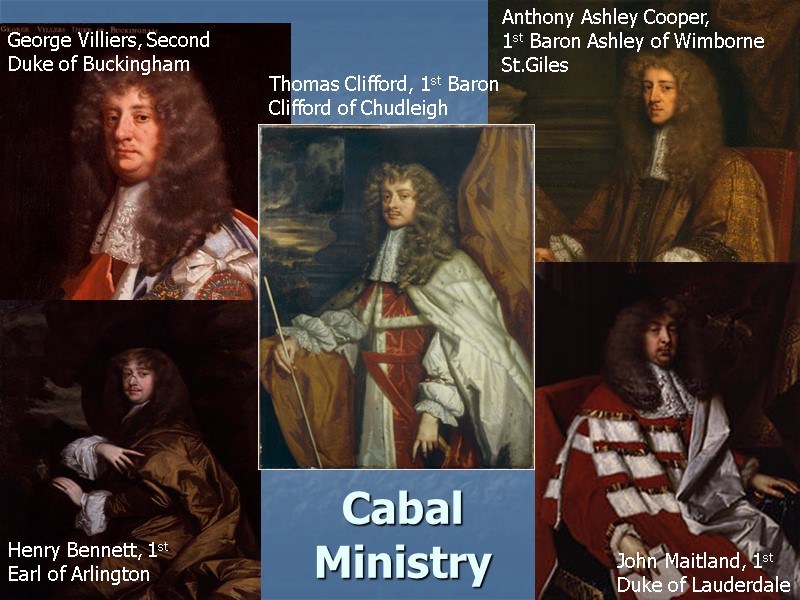
23856-charles_ii.ppt
- Количество слайдов: 13
 King of England and Scotland (29 May 1660-6 February 1685); Crowned 1 January 1651 at Scone, 23 April 1661 at Westminster Controlled colonies of Ireland, the Carribean (Barbados, Jamaica), New England (Rhode Island, New Haven, Connecticut, Maryland, Carolina, Virginia)
King of England and Scotland (29 May 1660-6 February 1685); Crowned 1 January 1651 at Scone, 23 April 1661 at Westminster Controlled colonies of Ireland, the Carribean (Barbados, Jamaica), New England (Rhode Island, New Haven, Connecticut, Maryland, Carolina, Virginia)

 Character AND Influence Charles’s own attitude, mocking, good-humoured, relaxed and self-indulgent, seemed to have rubbed off onto the nation under his rule. The ferocious bigotry of Puritanism was brought to an end. Good manners, rather than sectarian debate, were now of chief importance. Presbyterianism was ‘not a religion for gentlemen’. Charles was head and shoulders more cultured and cosmopolitan than his predecessors, having developed sophisticated tastes in the exile. Theatres were reopened; Classical standards were established in art; Science was being promoted.
Character AND Influence Charles’s own attitude, mocking, good-humoured, relaxed and self-indulgent, seemed to have rubbed off onto the nation under his rule. The ferocious bigotry of Puritanism was brought to an end. Good manners, rather than sectarian debate, were now of chief importance. Presbyterianism was ‘not a religion for gentlemen’. Charles was head and shoulders more cultured and cosmopolitan than his predecessors, having developed sophisticated tastes in the exile. Theatres were reopened; Classical standards were established in art; Science was being promoted.
 The ‘Merry’ King Charles brought a sense of fun to monarchy. He was immensely popular; He had an intuitive understanding of ordinary people. ‘If you had to choose one monarch to be your companion on a desert island, the choice would have to be Charles II’. He was utterly kind and charming, full of fun and laughter, brave and resourceful. As a human being. He was, on the weak side, rather self-indulgent, but the nation took his foibles to its heart; besides, he knew what it is to suffer hardship and yet remain cheerful.
The ‘Merry’ King Charles brought a sense of fun to monarchy. He was immensely popular; He had an intuitive understanding of ordinary people. ‘If you had to choose one monarch to be your companion on a desert island, the choice would have to be Charles II’. He was utterly kind and charming, full of fun and laughter, brave and resourceful. As a human being. He was, on the weak side, rather self-indulgent, but the nation took his foibles to its heart; besides, he knew what it is to suffer hardship and yet remain cheerful.
 Marital Life Catherine of Braganza, the Queen Consort of England did not provide England with an heir; Her dowry was one of the most important ever brought by a foreign princess: a large sum of money, the foreign cities of Bombay and Algiers, trading rights to China and the Indies.
Marital Life Catherine of Braganza, the Queen Consort of England did not provide England with an heir; Her dowry was one of the most important ever brought by a foreign princess: a large sum of money, the foreign cities of Bombay and Algiers, trading rights to China and the Indies.
 Illegitimate heirs Charles was kind to all the 16 of his bustards, 9 sons and 7 daughters, giving many of them honours and titles. To this day the aristocracy of England is people with the descendants of the amorous King. James Scott, 1st Duke of Monmouth Charles FitzCharles, 1st Earl of Plymouth Charles FitzRoy, 2nd Duke of Cleveland Charlotte Lee, Countess of Lichfield Henry FitzRoy, 1st Duke of Grafton George FitzRoy, 1st Duke of Northumberland Charles Beauclerk, 1st Duke of St Albans Charles Lennox, 1st Duke of Richmond
Illegitimate heirs Charles was kind to all the 16 of his bustards, 9 sons and 7 daughters, giving many of them honours and titles. To this day the aristocracy of England is people with the descendants of the amorous King. James Scott, 1st Duke of Monmouth Charles FitzCharles, 1st Earl of Plymouth Charles FitzRoy, 2nd Duke of Cleveland Charlotte Lee, Countess of Lichfield Henry FitzRoy, 1st Duke of Grafton George FitzRoy, 1st Duke of Northumberland Charles Beauclerk, 1st Duke of St Albans Charles Lennox, 1st Duke of Richmond
 The Declaration of Breda issued on April 4, 1660 proclamation by Charles II which promised: a general pardon for crimes committed during the English Civil War and the Interregnum for all those who recognised Charles as the lawful king; retention by current owners of their property; religious toleration; payment of pay arrears to members of the army the army to be recommissioned into service under the crown. The first three pledges were all subject to amendment by acts of parliament
The Declaration of Breda issued on April 4, 1660 proclamation by Charles II which promised: a general pardon for crimes committed during the English Civil War and the Interregnum for all those who recognised Charles as the lawful king; retention by current owners of their property; religious toleration; payment of pay arrears to members of the army the army to be recommissioned into service under the crown. The first three pledges were all subject to amendment by acts of parliament
 Disappointment to people: Disastrous war with the Dutch Coincident disasters: The Great Plague of 1665 and the subsequent Great Fire of London Unwillingness to be accountable for the absence or governance: ‘oblivion to friends and indemnity to enemies’ Sacrifices the men closest and most truthful to him
Disappointment to people: Disastrous war with the Dutch Coincident disasters: The Great Plague of 1665 and the subsequent Great Fire of London Unwillingness to be accountable for the absence or governance: ‘oblivion to friends and indemnity to enemies’ Sacrifices the men closest and most truthful to him
 The Great Plague (1665–1666) the last major epidemic of the bubonic plague to occur in the Kingdom of England the Second Pandemic, an extended period of intermittent bubonic plague epidemics which began in Europe in 1347, the first year of the "Black Death" and lasted until 1750. The Great Plague killed an estimated 100,000 people, about 20% of London's population. The 1665-1666 epidemic was on a far smaller scale than the earlier "Black Death" pandemic; it was remembered afterwards as the "great" plague only because it was the last widespread outbreak of bubonic plague in England during the 400 year timespan of the Second Pandemic.
The Great Plague (1665–1666) the last major epidemic of the bubonic plague to occur in the Kingdom of England the Second Pandemic, an extended period of intermittent bubonic plague epidemics which began in Europe in 1347, the first year of the "Black Death" and lasted until 1750. The Great Plague killed an estimated 100,000 people, about 20% of London's population. The 1665-1666 epidemic was on a far smaller scale than the earlier "Black Death" pandemic; it was remembered afterwards as the "great" plague only because it was the last widespread outbreak of bubonic plague in England during the 400 year timespan of the Second Pandemic.
 The Great Fire of London 1666 from Sunday, 2 September to Wednesday, 5 September 1666 gutted the medieval City of London inside the old City Wall Threatened the aristocratic district of Westminster, Charles II's Palace of Whitehall, and most of the suburban slums consumed 13,200 houses, 87 parish churches, St. Paul's Cathedral and most of the buildings of the City authorities destroyed the homes of 70,000 of the City's 80,000 inhabitants the death toll is thought to have been small only six verified deaths were recorded, but the deaths of poor and middle-class people were not recorded the heat of the fire may have cremated many victims leaving no recognisable remains.
The Great Fire of London 1666 from Sunday, 2 September to Wednesday, 5 September 1666 gutted the medieval City of London inside the old City Wall Threatened the aristocratic district of Westminster, Charles II's Palace of Whitehall, and most of the suburban slums consumed 13,200 houses, 87 parish churches, St. Paul's Cathedral and most of the buildings of the City authorities destroyed the homes of 70,000 of the City's 80,000 inhabitants the death toll is thought to have been small only six verified deaths were recorded, but the deaths of poor and middle-class people were not recorded the heat of the fire may have cremated many victims leaving no recognisable remains.

 Edward Hyde, Lord Chancellor Clarendon became chief advisor to the King; named Lord Chancellor in 1658; served as Chancellor of the University of Oxford from 1660-1667; his daughter, Anne, secretely married king's brother James, Duke of York; Mary II and Queen Anne are both his direct heirs; as Lord Chancellor authored "Clarendon Code“ to preserve the supremacy of the Church of England; military setbacks of the Second Anglo-Dutch War of 1665 to 1667 led to his downfall; Clarendon was impeached by the House of Commons, and forced to flee to France in November, 1667.
Edward Hyde, Lord Chancellor Clarendon became chief advisor to the King; named Lord Chancellor in 1658; served as Chancellor of the University of Oxford from 1660-1667; his daughter, Anne, secretely married king's brother James, Duke of York; Mary II and Queen Anne are both his direct heirs; as Lord Chancellor authored "Clarendon Code“ to preserve the supremacy of the Church of England; military setbacks of the Second Anglo-Dutch War of 1665 to 1667 led to his downfall; Clarendon was impeached by the House of Commons, and forced to flee to France in November, 1667.
 Cabal Ministry George Villiers, Second Duke of Buckingham Anthony Ashley Cooper, 1st Baron Ashley of Wimborne St.Giles Henry Bennett, 1st Earl of Arlington Thomas Clifford, 1st Baron Clifford of Chudleigh John Maitland, 1st Duke of Lauderdale
Cabal Ministry George Villiers, Second Duke of Buckingham Anthony Ashley Cooper, 1st Baron Ashley of Wimborne St.Giles Henry Bennett, 1st Earl of Arlington Thomas Clifford, 1st Baron Clifford of Chudleigh John Maitland, 1st Duke of Lauderdale
